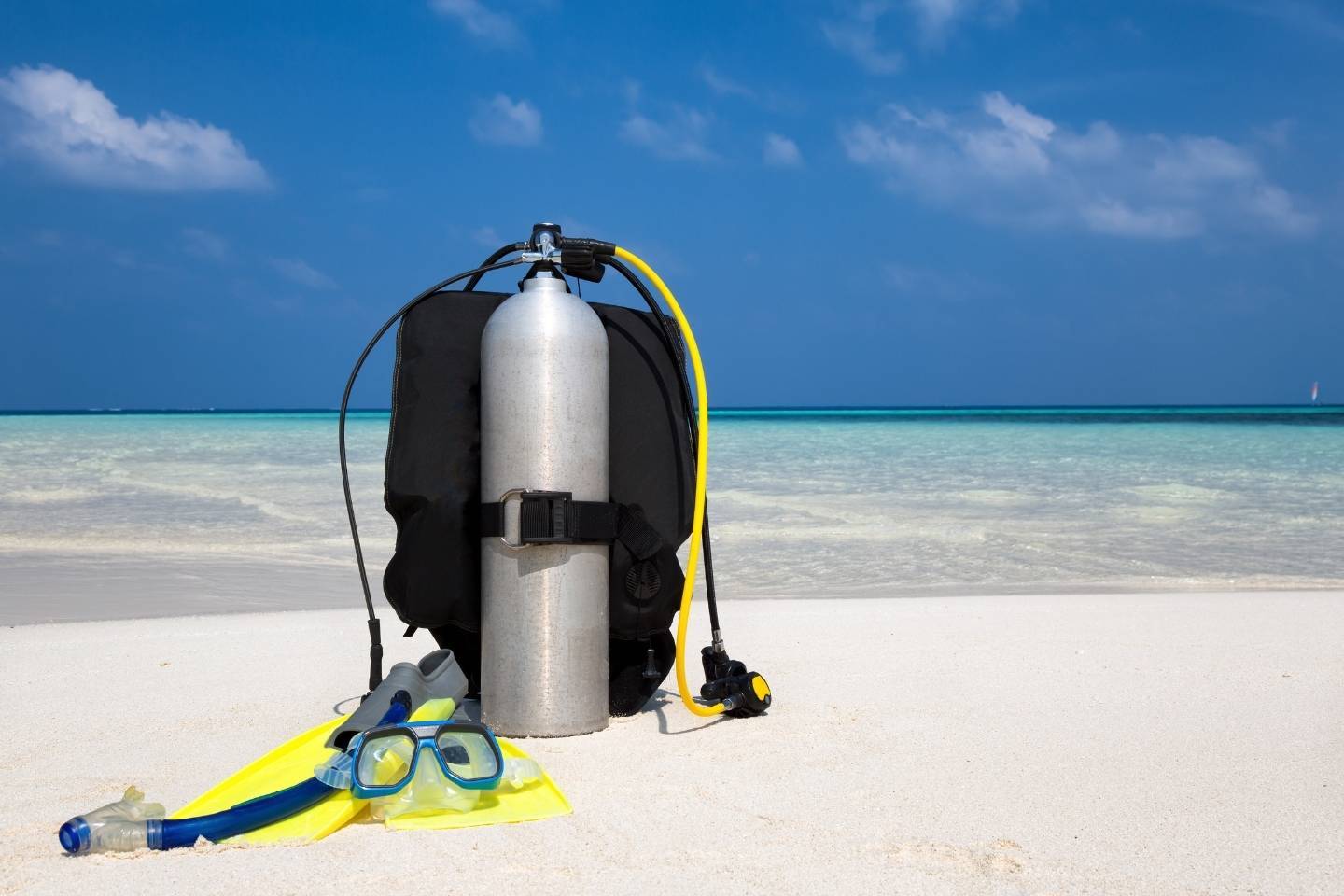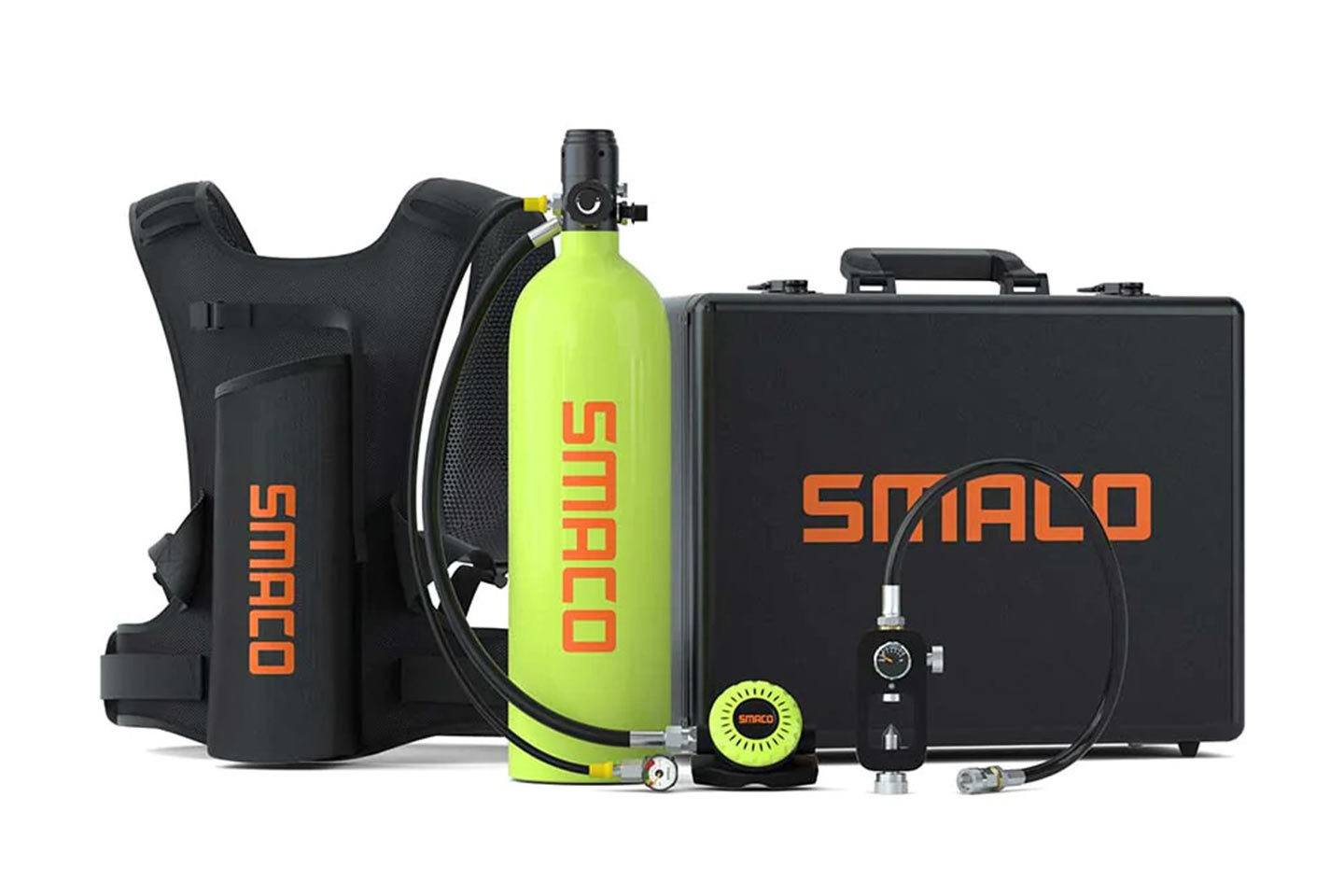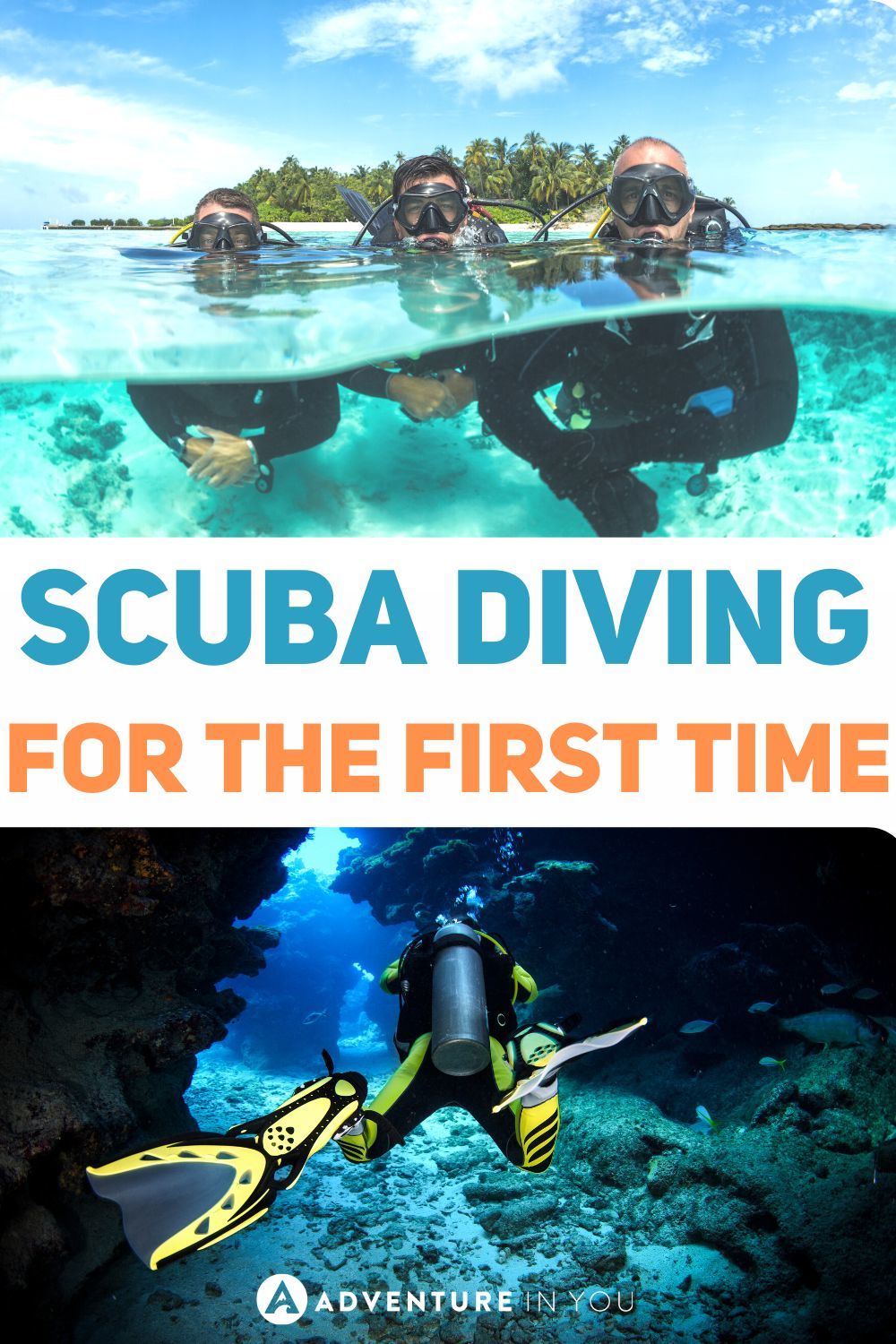Looking for a quick guide on scuba diving for the first time? Look no further as I’m going to fill you in on what to expect.
There’s nothing like basking in the majestic beauty of the great underwater world. You get to see shipwrecks, colorful reefs, and even see marine life up close and personal.
Between the incredible marine life and the peace and quiet of the calm turquoise waters, what’s not to love?
But we know that, even if scuba diving sounds like an amazing adventure, it seems daunting at first, especially when it’s your first time! This article can help calm your nerves and know what to expect when trying out diving for the first time.

View Contents
Introduction to Scuba Diving
For those who don’t know this yet, SCUBA is short for Self-Contained Underwater Breathing Apparatus. Diving will allow you to breathe and move more freely when underwater.
Combine the two, and you get scuba diving, a recreational sport where you can stay underwater for much longer without needing to go back to the surface for air.
Through scuba diving, you get to discover the underwater world and ecosystems that are otherwise inaccessible without the appropriate gear. The sport allows people to explore and take photos of coral formations, reefs, and shipwrecks, and take in all the unique sceneries of the underwater world.
The maximum depth for recreational diving is 40 meters, though divers can only reach that depth limit after acquiring appropriate training and experience.
Beginner courses will limit the maximum depth to 18 meters until the diver obtains enough training and experience to go further.
Many first-timers worry about the safety of scuba diving, presuming that it is a challenging and dangerous sport.
Not to worry, folks, as scuba diving’s mortality rate is negligible, with most accidents occurring due to people disrespecting the limitations of their training and experiences. Most emergencies tend to happen because of inadequate knowledge and poor training.
While scuba diving isn’t difficult, there are rules to follow, just like with any sport. As long as you educate yourself and follow your training from a reputable dive instructor, the risks are minimized, and you can focus more on having fun.
Scuba Diving Courses for First Timers
Here’s a quick breakdown of the different scuba diving courses that you can do/ try out.
Discovery Dive – Discovery Dives are a great way to test out the waters to see if diving is for you. It is a single day activity and usually starts with some pool training before moving you on to the open ocean. DSD are meant to get you familiar with your scuba gear and how to properly use them.
Open Water Course- There are two main open water certification bodies, PADI or SSI. If you end up deciding that scuba diving is for you, you can sign up for a multi-day open water certification which will allow you to go 18 meters/60 feet as long as you’re with a Dive Master/ pro.
Advance Open Water- Intermediate divers can look into getting their Advance Open Water certification which allows you to go 30 metres (100 ft). Personally speaking, I’ve gone diving in many places around the world and have found the Open Water to be more than enough. Only certain dives (shipwrecks) require an advance certification due to the maximum depth you end up going.

Scuba Diving Tips for First-Time Divers
If you just booked your scuba diving trip, your instructor will first have you take a basic course in the swimming pool to learn how to properly use the equipment, breathe, float, control your pressure, and the like. Once you’re ready and comfortable, you’ll start to move to the sea.
Don’t worry, as your instructor will be with you the entire time and teach you everything to know. To prepare yourself further, here are a few tips to follow:
Choose a Reputable Dive School
The most important decision you need to make as a first time scuba diver is making sure that you go with a reputable dive school. Look at their dive equipment to see if they are relatively new / well maintained.
Taking the time to read the reviews and ensuring you’re in good hands will go a long way! I made it a point to speak with my instructor before I signed up to do the lessons and I immediately felt much more at ease.
Consider the Weather when Scheduling your Dive
The weather conditions may affect diving day, with strong waves making it difficult to reach the targeted point of immersion. It may also create underwater currents that can be dangerous for first-timers to explore.
If the weather doesn’t look good, you can always postpone when the conditions improve.
Don’t Be Afraid to Ask Questions
Never go underwater if you still have some doubts. Remember, once you’re underwater, you can’t communicate as you would on land. As such, you must understand the protocols, hand signals, what you must do underwater, and the overall plan.
Your instructor will go over everything and if you want to clarify something, do not hesitate to raise your hand and ask!
Remember to Breathe
You’ve got a tank filled with oxygen at your back, so you can breathe normally. Understandably, nerves can have you hold your breath or quicken your breathing rate as you dive, but you must relax!
Inhale and exhale slowly, just as you would on the surface. Although breathing underwater seems unnatural and uncomfortable, the sooner you relax, the easier it becomes!
Moreover, avoid moving too much so you won’t get tired quickly, which can lead you to breathe faster and spend more of your stored oxygen.
Don’t Touch Anything Underwater
Despite what you see on shows, one of the most important rules when exploring underwater is to not touch anything. You can see it, but you can’t touch it, even if you’re very curious and feel like it.
You never know, you might be harming something, or they may harm you. Remember, we are only guests underwater and taking extra precaution to make sure that we aren’t disrupting their habitat is key to having a great experience.
These are just a couple of tips. Overall, make sure that you ready yourself, physically and mentally. Keep a positive attitude and control your nerves, focus on having fun.
If you fall in love with scuba diving, consider doing a Liveaboard Experience where you get to travel to remote diving destinations around the world.

Psst...Want in on a Secret? 🤫

We've scoured the internet for the best ALL-AROUND travel shoe and Tropicfeel wins by far. We've taken ours through rivers, jungles, and cities and they're still alive and kickin'. Check them out below.
Buying Scuba Gear
Another important part of scuba diving is acquainting yourself with the equipment.
The pieces of equipment we’ll tackle below are all optional if you are a first-timer as you can rent them from dive centers to test the waters first (get the pun?).
That said, we understand some people prefer owning their own equipment once they get into the sport more so here are a few recommendations.
Scuba Diving Mask
A good scuba diving mask can make or break your experience! Otherwise, you won’t be able to see much underwater. I’ve gone on dives where the masks keep fogging up and it isn’t a nice experience.
Scuba diving masks will allow divers to see clearly underwater, as well as protect the eyes and nose.
High-quality scuba diving masks keep your eyes free from fog and encourage maximum visibility to know where you are going every time by providing airspace in front of the eyes.
Here are a few high-quality brands we recommend if you plan to invest in a scuba diving mask:
- Cressi F1 Scuba Diving Mask for its comfort and adjustability.
- Kraken Aquatics Snorkel Dive Mask for its durability and lightweight features,
- Tusa M1001 Freedom Scuba Diving Mask for maximum visibility.
Editor’s Note: Check out our article on Best Snorkel Gear where we give tips on our favorite scuba diving masks and snorkels!
Scuba Fins
Scuba fins are important gear that helps divers move swiftly and efficiently underwater without exerting as much effort. Fins are designed in a way to provide a wider area to push and move against water, so you won’t need to use your hands.
Moreover, you have more power to overcome waves and currents, along with the control to navigate the waters without overexerting yourself.
There are certain brands we recommend for their strength and power that have you take on the waters comfortably:
- US Divers Proflex II Snorkel Fins for its excellent strength to propel you in the waters.
- Cressi Palau Short Snorkeling Swim Fins for their portability.
- Atomic Aquatics Lightweight High Energy Compound Split Fins for its power and lightweight features.
Portable Dive Tank
Portable dive tanks are lightweight and portable versions of the regular scuba tank. That said, this piece of equipment is not advisable for first-timers and must be used under the supervision of a dive school.
Portable dive tanks are recommended for scuba divers who are properly trained and with the appropriate certificates. It’s also only best for those diving in shallow waters, to use as a redundant air source, or in case of emergencies.
For those who plan on getting a portable dive tank, the SMACO S700 2L Portable Scuba Tank is worth considering for its lightweight features and ease of use. It is DOT-certified and can be used for about 540 underwater breaths at full capacity, which is about 20-25 minutes of diving time.
Reader’s Discount: Get 6% off using coupon code: ADVENTURE6 at smacosportscom

Dive Computer
A dive computer is a dive watch that gives you incredible information while you’re underwater. It tells you your maximum depth, oxygen levels, and more.
Some dive schools will give you one to use during your certification however if you’re looking to purchase your own, here’s our recommendation for the best dive computers.
Conclusion: Enjoy the Underwater World!
Scuba diving doesn’t have to be so scary when you’re equipped with the right knowledge, training, and equipment.
If you plan to go scuba diving for the first time, work with a certified dive instructor and always follow their instructions to stay safe underwater. Good luck and have fun on your first-time scuba diving!
For more diving content check out these articles:
Inspired? Pin it!
